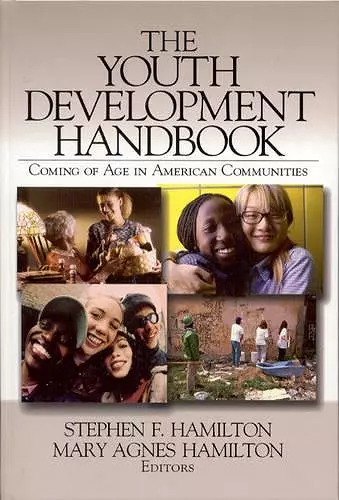The Youth Development Handbook
Coming of Age in American Communities
Mary Agnes Hamilton editor Stephen F Hamilton editor
Format:Paperback
Publisher:SAGE Publications Inc
Published:2nd Dec '03
Currently unavailable, and unfortunately no date known when it will be back
This paperback is available in another edition too:
- Hardback£185.00(9780761926344)

"In recent years, the fields of psychology and human development have focused growing attention on issues of positive youth development. . . . This volume provides a tool that can be used by researchers, practitioners, and policy makers alike to build collective efforts to enhance the well-being of youth. . . . Professor Hamilton is one of the most respected scholars in the country. There is no doubt in my mind that this volume will not only make a significant contribution in the field, but more important, that it is a volume that will be utilized across disciplines and professions."
—Francisco A. Villarruel, Michigan State University
"The conceptualization and comprehensiveness are excellent. The book also deals with a newly emerging and exciting field and hence is at the forefront of research, policy, and practice. . . . a useful resource."
—Lonnie Sherrod, Fordham University
"Both timely and potentially very useful…nothing nearly as inclusive as this youth development handbook now exists."
—John Kretzmann, Northwestern University
"A handbook like this is a good idea because of the interest in communities and colleges in this topic and because of the number of programs being developed targeted at adolescents. . . . I believe the book will serve as a useful reference for scholars, policy makers, and program development specialists. . . . There are no other comparable resources that focus on exemplary programs and community development issues."
—Philip Newman, University of Rhode Island
What are the types of environments in which youth thrive? How do we cultivate such environments to promote optimal development and positive behavior in youth? The Youth Development Handbook: Coming of Age in American Communities provides youth and development practitioners access to current theory and research in the field of youth development, including illustrations of good practice, original case studies, and a contextual approach to such topics as youth participation and diversity.
Because youth practitioners typically identify themselves with one or more contexts, such as youth-serving organizations or faith-based organizations, editors Stephen F. Hamilton and Mary Agnes Hamilton have arranged the book so that each chapter explores the application of youth development principles to its context, drawing on current research. Part I of the book is...
"In recent years, the fields of psychology and human development have focused growing attention on issues of positive youth development. . . . This volume provides a tool that can be used by researchers, practitioners, and policy makers alike to build collective efforts to enhance the well-being of youth. . . . Professor Hamilton is one of the most respected scholars in the country. There is no doubt in my mind that this volume will not only make a significant contribution in the field, but more important, that it is a volume that will be utilized across disciplines and professions."
-- Francisco A. Villarruel"The conceptualization and comprehensiveness are excellent. The book also deals with a newly emerging and exciting field and hence is at the forefront of research, policy, and practice. . . . a useful resource."
-- Lonnie Sherrod"Both timely and potentially very useful…nothing nearly as inclusive as this youth development handbook now exists."
-- John Kretzmann"A handbook like this is a good idea because of the interest in communities and colleges in this topic and because of the number of programs being developed targeted at adolescents. . . . I believe the book will serve as a useful reference for scholars, policy makers, and program development specialists. . . . There are no other comparable resources that focus on exemplary programs and community development issues."
-- Philip NewmanISBN: 9780761988724
Dimensions: unknown
Weight: 570g
424 pages